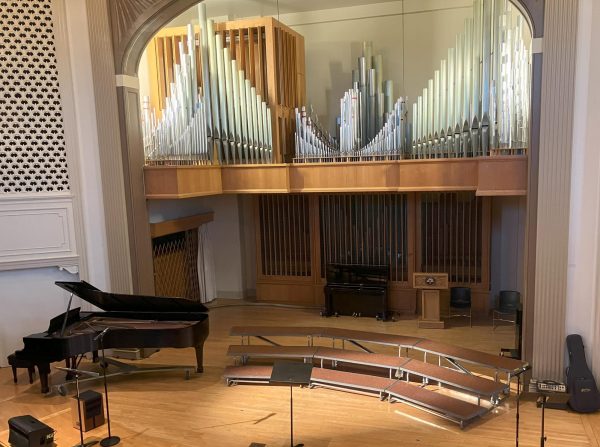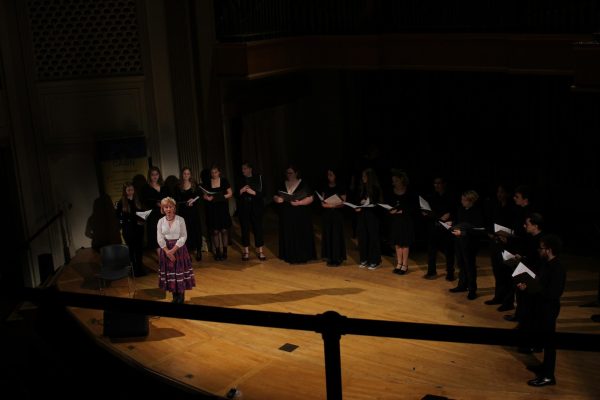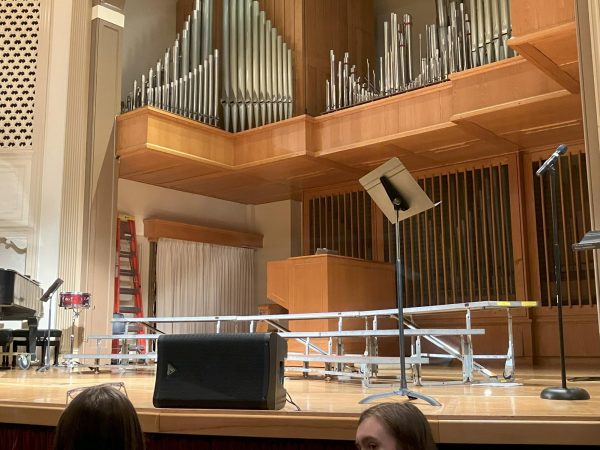Rumors of faculty layoffs lead to tensions and student protests
December 13, 2018
This story is part one of a multi-article series on the rumors of faculty layoffs and the budget restructuring. The following articles will cover faculty, staff and student responses.
Murmurs of faculty layoffs and department cuts permeated Ice Auditorium Wednesday afternoon during a faculty and staff meeting to discuss the potential of restructuring Linfield’s budget.
The open College Board meeting, which was originally scheduled to take place in Jonasson Hall, but was moved to Ice Auditorium to accommodate more people, came in response to an email sent to faculty by the Faculty Executive Committee over the weekend.
FEC Chair and biology professor John Syring, FEC Vice-Chair Liz Atkinson, Faculty Trustee and political science professor Nick Buccola, and Dean of Faculty Jackson Miller met with President Miles Davis, Provost Susan Agre-Kippenhan, Vice President of Finance and Administration Mary Ann Rodriguez, and Vice President for Institutional Advancement John McKeegan on Dec. 7.
According to the email sent to faculty by the FEC about the meeting, Davis told the faculty representatives that 20-25 positions would have to be cut to reduce $2.7-2.8 million of the college’s $3 million deficit. The rest of the $3 million would come from the other groups of employees.
The email indicates that according to Davis, faculty would need to decide on these cuts by Dec. 15, eight days after the meeting. Faculty would know their job status by Dec. 14.
The email reads that “[f]aculty were asked two main questions:
- Do the faculty want to participate in choosing the 20-25 positions to be eliminated?
- Do the faculty want an extension on helping make these decisions until January? Note that faculty would have to request this extension, violating the language of our handbook.”
Davis then, according to the email, gave faculty until 5 p.m. that same day to decide. Not wanting to violate their Faculty Handbook, the FEC representatives voted against extending the deadline to make a decision on cuts to January. After sending the email, the FEC received one from Davis saying the Dec. 15 deadline no longer applied and a “call to populate a committee to evaluate departmental data would be made in the upcoming week.”
The email also refers to a faculty forum that would be held Dec. 12, but does not include details on when or where the forum would be held.
Davis responded by sending out a second email stating that the previous one was inaccurate and misrepresented the situation.
“Yesterday, the FEC chair sent a message with what could be considered inaccurate, incomplete and misleading information,” Davis wrote.
He continued that he was scheduling a College Cabinet meeting to be held openly on Dec. 12. The meeting would be recorded and all faculty were invited.
Today was the College Board meeting regarding the situation and the potential cuts. Davis stated that no faculty will be cut by Saturday.
A group of students decided to protest the potential cuts and show solidarity with faculty by holding signs stating their mission. They also wanted to show Davis and the administration that they were paying attention to this discussion. They later specified that they didn’t want their quality of education to decrease from faculty being cut. They also said that the mission is not for a lack of faculty cuts, but for the administration to be more reasonable than the email alluded to.
Protest leader Bailey Morales said he heard about the situation and emails from 10 professors across four departments. He described the goal for the protest as a silent, non-aggressive demonstration to Davis and other members of college administration. Morales stated that he and other students were suspicious about the timing of this event during finals week when some students are off campus and both students and faculty are busy.
Around 20 students congregated in Riley Center before walking over to Melrose. Morales instructed students to remain silent and not to disrupt the event or be aggressive. Campus Public Safety followed the students and monitored the protest the entire time.
The students had been protesting for about 15 minutes when Davis walked up to them on his way to Ice. Davis invited the protesters to come inside the auditorium and hear him speak at the College Board meeting to “hear the rest of the story,” then walked away. Some students turned to Morales, who silently shook his head “no.”
Later, some protesters did enter Ice to hear Davis speak. At no time did any student protester disrupt the event. After the event, a few of the student protesters who wished to be anonymous said they were taken aback by how aggressive the deemed Davis and his invite to be.
This meeting was an open meeting of the recently formed College Cabinet, where members represent all areas of the college and discuss issues facing the college such as the budget deficit. The student representative is ASLC President Kainoa Cuttitta.
President of the Board of Trustees Dave Baca gave the introductory remarks at the event. He began by reminding the audience that he was a graduate from Linfield, which was met with applause.
“To do this it’s going to take the whole college,” Baca said. “Change is never unanimous.”
Baca talked about figuring out where to implement the focus, and said that the board supported these conversations and wanted them to happen.
“Nibbling around the edges has not got us where we need to get. There has been pain in the last few budget cycles…but we think we can succeed. And we can do this well,” Baca said. “This can’t happen in 10 years, this can’t happen in five years. It’s ought to start now.”
“We are not attracting enough students and we need to do more,” Baca said before thanking everyone for showing up and participating.
“I’m not sure what they’re protesting,” Davis remarked on student protesters outside Melrose. He said that he read a sign demanding quality education and said everyone in the room wanted that.
“I find it ironic that students were not encouraged to protest when there were people at the poverty line losing their jobs,” he said referring to earlier staff layoffs. Some audience members responded with applause.
Davis then addressed the root of the budget issue.
He said that in the past three years, enrollment has gone down 19.8 percent, then asked his audience: “Is there any organization that you know that has received a 20 percent decline in customers that has not sought to restructure itself?”
“Every five students we lose, we lose $100,000,” said Mary Ann Rodriguez, the vice president of finance and administration.
For the past three years, the college has been bailed out by assets and another support from the Board of Trustees.
“There are those who have asked me about decisions that were made in the past,” Davis said. “I wasn’t here.”
“There have been no decisions made about faculty,” Davis said. “There were no plans to cut people on Dec. 15.”
When discussing what programs or departments could potentially be cut, Davis said “it is not about if I like it or if I don’t like it.” It must be fiscally realistic to keep those things and they determine that by how students vote using the selection of their programs.
Davis said that he does not want to have to restructure the budget again. He wants to do it once and then push forward with growth. Davis alluded to a decision needing to be made by the Board of Trustees meeting happening in May.
“I don’t want it to become us versus them,” he said. Davis went on to talk about how employees at Linfield have different levels of education, which means that they have different levels of job opportunities and mobility. He alluded to an ability for faculty to uproot and move across the country.
“The reality is the world has changed,” Davis said when talking about the importance of adaptability, especially with the climate of some colleges closing or merging across the country. He said that Linfield has been adapting and restructuring. He acknowledged that while the process doesn’t feel good right now the school still has to be adapting.
Davis said he is aware some people like him and some do not. He said that he is “committed to transparency” and that there was “nothing I will hide from you because we are all in this together.”
There will be a follow-up story on the closed faculty forum held at 3 p.m. Wednesday.











Sara Greenleaf • Dec 13, 2018 at 9:28 am
What pieces of the email that the FEC sent were inaccurate besides the December 15 deadline for cuts to faculty and staff? Was the rest of the FEC’s email factually correct?
Sincerely,
Sara Greenleaf
Helen Feller • Dec 13, 2018 at 9:17 am
Will the Linfield Review please investigate and write about how the faculty cuts will impact students’ time to graduation? Specifically, will students now have to spend more time at Linfield because the classes needed to complete major requirements are not available? Also, is there an option to increase recruitment to lessen the faculty cuts? Lastly, is there a possiblilty of raising tuition to also lesson the number of faculty positions needing to be cut?
The faculty are so talented and the whole rebranding and financial restructuring maybe be a necessary aspect of keeping Linfield college in “the black,” but it is very disheartening to think my Linfield student will lose the opportunity to be educated by so many wonderful faculty…as a parent I would rather pay a few thousand dollars more a year if it met only minimum cuts to faculty.
Thank you for covering this situation! As a parent, I really have not received any information from Linfield that there is a financial crisis.
Sincerely,
Helen